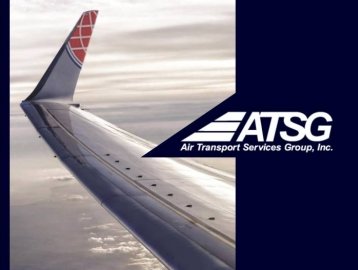
ATSG's revenue soared by $41.1 million in first quarter
Air Transport Services Group’s (ATSG’s) first quarter 2020 results, as compared with the first quarter of 2019, which include customer revenues that rose by 12 percent, or $41.1 million, to $389.3 million.

Air Transport Services Group’s (ATSG’s) first quarter 2020 results, as compared with the first quarter of 2019, which include customer revenues that rose by 12 percent, or $41.1 million, to $389.3 million. Both of ATSG's principal business segments, aircraft leasing and air transport, plus its other businesses on a combined basis, generated higher revenues.
GAAP (generally accepted accounting principles) earnings from continuing operations were $133.7 million versus a $22.6 million for the prior year, including warrant-related effects in each period.
Quarterly re-measurements of financial instrument values increased first quarter after-tax earnings by $108.1 million and $4.9 million in 2020 and 2019, respectively. Warrant gains in each quarter stemmed primarily from decreases in the traded value of ATSG shares in the first quarter of each year.
Adjusted earnings from continuing operations (non-GAAP) rose 13 percent, to $29.3 million. Adjusted Earnings Per Share (non-GAAP) were $0.43 diluted, up $0.06. Adjusted Earnings from Continuing Operations and Adjusted EPS exclude elements from GAAP results that differ distinctly in predictability among periods or are not closely related to operations. Adjustments from GAAP include financial instrument revaluations, amortisation of aircraft lease incentives, retiree benefit costs, losses of non-consolidated ATSG affiliates, and acquisition-related expenses.
Adjusted EBITDA from Continuing Operations (non-GAAP) increased 9 percent, to $124.0 million. Contributions from our airlines, and from the increase in externally leased 767 freighters, drove the majority of the increase in Adjusted EBITDA.
Adjusted Earnings per Share, Adjusted Earnings from Continuing Operations and Adjusted EBITDA from Continuing Operations are non-GAAP financial measures and are defined in the non-GAAP reconciliation tables at the end of this release. Capital spending was $143.5 million, up 56 percent. Capital expenditures included $105.4 million for the purchase of five Boeing 767 aircraft in the first quarter, and for freighter modification costs.
Joe Hete, chief executive officer of ATSG, said, “The flexibility and resilience of ATSG’s business model again proved its value, as the company responded to rapidly changing business conditions with the speed and attention to detail that its customers demand, while generating solid financial results overall. As an example, our aircraft maintenance technicians on short notice completed avionics adjustments to the New England Patriot's 767 aircraft that enabled it to fly to China to pick up more than 1 million masks for health care workers in Massachusetts. Similarly, our airlines' pilots, flight attendants and line maintenance techs are answering the call from their global customers to maintain the flow of vital supplies and personnel under very challenging conditions. Despite the pandemic, we remain cautiously optimistic about the rest of 2020, as we deploy more 767 converted freighters for customers responding to expanded e-commerce shopping, and operate passenger aircraft to support the U.S. military’s evolving requirements.”
ATSG's airlines operated sixty-nine aircraft at March 31, fifteen passenger and fifty-four cargo aircraft. Two of ATSG's four 757-200 freighters are expected to remain available for service through 2020, although current DHL commitments for ATSG's 757-200 freighters ended May 1.
Rich Corrado, President, said that “We are staying in constant contact with our principal customers as the pandemic continues. Today, they are telling us that they intend to continue to use our aircraft and other resources largely in line with their earlier expectations, including plans to lease seven to nine more of our newly converted 767s this year. Most of our cargo aircraft continue to operate within expanding time-definite express networks as e-commerce transactions accelerate during the pandemic. Demand for our passenger aircraft, however, is expected to remain sensitive to pandemic-driven changes in the U.S. military’s troop deployment and rotation plans, and reductions in operations for Omni commercial customers through 2020.”

